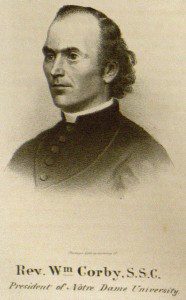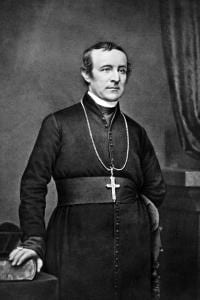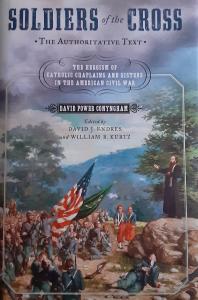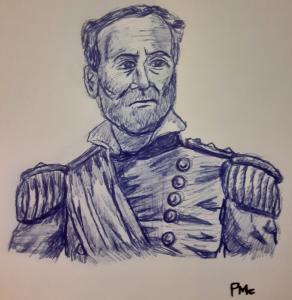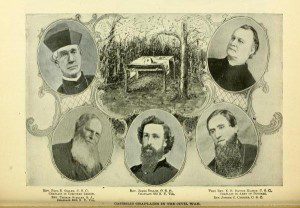 FATHER CORBY’S DESCRIPTION OF A MILITARY MASS
FATHER CORBY’S DESCRIPTION OF A MILITARY MASS
On or about the 4th day of September, 1864, Gen. Meagher, who was on a visit with Gen. Hancock at the time, prior to his departure for the department of Gen. Sherman, to whom he had been assigned for duty, proposed an anniversary celebration for the brigade. The brigade was now three years old. As usual, he wished to have the anniversary commemorated in a religious manner. He therefore, asked me, if I would be so kind as to arrange a Solemn High Mass for the occasion. I was only too glad to do him this favor. Invitations were sent out to various other commanders to join us in the celebration. These invitations were accepted by quite a number of other commands, and by the following generals, namely: Hancock, Miles, Birney, Gibbons, Mott, De Trobriand, and, of course, Meagher himself would be expected.
Details of men with willing hands were directed in clearing up, beautifying the grounds, planting pine and cedar trees, and making the entire camp like fairy-grounds. A beautiful chapel tent was erected, and a grand avenue lined with evergreens led to the front entrance of the grounds and to the chapel, which was on a slight eminence. Seats were provided for the invited guests as far as possible. About nine o’clock the bugles were sounded, and the whole brigade, at this signal, began to make preparations to receive their guests. With military precision every man reported, and in a short time one could see the ranks formed in perfect order.
Precisely at ten o’clock, the hour fixed for service, the guests began to arrive. The generals were seated first, and, as each company, battalion, or regiment of invited troops arrived, place was allotted them, the members of the brigade “doing the honors.” The Rev. Thomas Ouellet, S.J., Paul E. Gillen, C.S.C, and the writer, appeared before a simple altar, dressed in modest taste, at the very moment ten o’clock was sounded by the bugle. By this time we had become experienced in such celebrations, and it is with some laudable pride that we refer to them now. Gen. Meagher, being well versed in the ceremonies of the Mass, acted as Master of Ceremonies, in as far as the music and the military duties were concerned. As soon as the priests are ready, the Asperges me was announced, and, instead of a grand choir, such as is heard in the royal cathedrals of Christendom, the bugles, followed by the report of numerous guns, announced the beginning.
Then, under the direction of Gen. Meagher, at the Introibo various military bands discourse solemn music until after the Credo, when, again, by a sign from the Master of Ceremonies to the Officer of the Day, another discharge, a grand salute of guns, testify to Credo in unum Deum— “I believe in one God.” The bugle follows with its well-known notes, “tara-taran-tara,” and again the bands play. Now their music is soft, low, and sweet, suitable to the devotion that immediately disposes the faithful for the more sacred portion of the Mass. The Sanctus, Sanctus, Sanctus rouses all to a fixed attention and is accompanied by a sudden rattle of dozens of kettle-drums, with an occasional thundering sound from the bass drums. Shortly after this comes that moment of moments in the offering of the sublime mysteries.
The preparatory is over, and now you see men bow down in deep devotion as the priest leans over the altar and takes up the Host. Here, at a sign from the Master of Ceremonies, the bugle notes, “tara-taran-tara,” ring out over the tented fields, and the same grand evidence of respect and faith is given by the sound of cannon and the roll of musketry, as the sublime words, full of power and purpose— the supreme words of Consecration— are pronounced. Soft music is again in order at intervals, until the end, which is proclaimed in turn by guns, drums, and bugles.
Thus we see how God is served, even in camp. We behold the highest honors paid to Him by the solemn offering of the Holy Sacrifice, infinitely holier than that offered in the Temple of Solomon, amid the splendor of glittering gold and the flashing light of precious stones. No military equipage is too fine, no military honors too great, no music too sweet or too sublime, no respect too profound, in honor of the great God in the transcendent Mystery of His love and mercy— a Mystery offered on Mount Calvary, when Nature herself spoke in greatest reverence and covered her face in darkness; to hide it from the too great majesty of the Divine Being.
Our Church and Country: The Catholic Pages of American History, Volume I (New York: The Catholic Historical League of America, 1905), 104-105.
NOTE: The above account is taken from the wartime memoirs of Rev. William Corby, C.S.C. (1833-1897), who served as a Chaplain with the Irish Brigade for three years in the Civil War. After the war, he twice served as President of the University of Notre Dame. Corby Hall on the campus was named in his honor. The Holy Cross community sent more chaplain-priests to serve the troops during the Civil War than any other diocese or religious community. Brigadier General Thomas Francis Meagher (1823-1867) helped organize the Irish Brigade, originally composed of the 69th New York (“the Fighting 69th”), the 63rd New York, and the 88th New York. (Other units were added later.) Father Corby’s memoirs, published in 1893, were a bestseller. They are still in print today.

